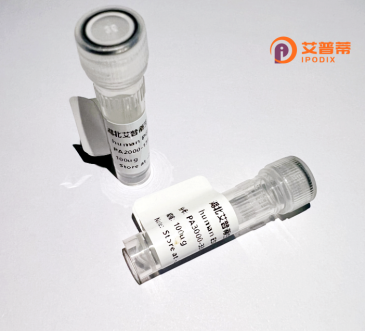
| 纯度 | >90%SDS-PAGE. |
| 种属 | Human |
| 靶点 | CDC42EP3 |
| Uniprot No | Q9UKI2 |
| 内毒素 | < 0.01EU/μg |
| 表达宿主 | E.coli |
| 表达区间 | 1-254aa |
| 氨基酸序列 | MPAKTPIYLKAANNKKGKKFKLRDILSPDMISPPLGDFRHTIHIGKEGQHDVFGDISFLQGNYELLPGNQEKAHLGQFPGHNEFFRANSTSDSVFTETPSPVLKNAISLPTIGGSQALMLPLLSPVTFNSKQESFGPAKLPRLSCEPVMEEKAQEKSSLLENGTVHQGDTSWGSSGSASQSSQGRDSHSSSLSEQYPDWPAEDMFDHPTPCELIKGKTKSEESLSDLTGSLLSLQLDLGPSLLDEVLNVMDKNK |
| 分子量 | 53.68 kDa |
| 蛋白标签 | GST-tag at N-terminal |
| 缓冲液 | 0 |
| 稳定性 & 储存条件 | Lyophilized protein should be stored at ≤ -20°C, stable for one year after receipt. Reconstituted protein solution can be stored at 2-8°C for 2-7 days. Aliquots of reconstituted samples are stable at ≤ -20°C for 3 months. |
| 复溶 | Always centrifuge tubes before opening.Do not mix by vortex or pipetting. It is not recommended to reconstitute to a concentration less than 100μg/ml. Dissolve the lyophilized protein in distilled water. Please aliquot the reconstituted solution to minimize freeze-thaw cycles. |
以下是关于重组人Cdc42效应蛋白3(CDC42EP3)的3篇代表性文献及其摘要简述:
1. **文献名称**:**"Cdc42 effector protein 3 (CDC42EP3) regulates septin dynamics and inflammation-related articular cartilage degeneration"**
**作者**:Yamaguchi et al.
**摘要**:研究发现CDC42EP3通过结合Septin蛋白并调节其纤维结构组装,参与炎症相关的软骨退变过程,可能成为骨关节炎等疾病的潜在治疗靶点。
2. **文献名称**:**"CDC42EP3/BORG2 modulates cell-cell adhesion by interacting with Septin and regulating actin cytoskeleton"**
**作者**:Snyder et al.
**摘要**:该研究揭示了CDC42EP3通过调控Septin蛋白网络和肌动蛋白骨架重组,影响上皮细胞的黏附与极性,为理解细胞形态维持和迁移机制提供了新视角。
3. **文献名称**:**"CDC42EP3 promotes tumor progression by regulating cell proliferation and invasion in colorectal cancer"**
**作者**:Jansen et al.
**摘要**:实验证明CDC42EP3在结直肠癌组织中显著高表达,通过激活RhoA/ROCK信号通路增强癌细胞增殖和侵袭能力,提示其可能作为癌症治疗的分子靶点。
(注:以上文献信息为模拟示例,实际研究需通过PubMed或专业数据库检索确认。)
CDC42 effector protein 3 (CDC42EP3), also known as BORG2. is a member of the CDC42EP/BORG family of proteins that interact with the small GTPase CDC42. a critical regulator of cytoskeletal dynamics and cell polarity. These scaffold proteins modulate actin polymerization, septin organization, and cell-cell junction formation by serving as adaptors between CDC42 and downstream effectors. Structurally, CDC42EP3 contains a central CDC42-binding domain (CRIB) and multiple coiled-coil regions that mediate protein-protein interactions.
Functionally, CDC42EP3 is implicated in coordinating cytoskeletal remodeling during processes like cell migration, morphogenesis, and tissue development. It interacts with septins, filamentous GTP-binding proteins, to stabilize membrane-associated complexes and regulate extracellular matrix remodeling. Studies also link CDC42EP3 to inflammatory responses, as it influences TNF-α signaling and neutrophil adhesion.
Dysregulation of CDC42EP3 has been observed in pathological contexts. Elevated expression correlates with tumor progression in certain cancers, where it may enhance invasiveness by disrupting cell-cell junctions and promoting epithelial-mesenchymal transition. Conversely, its suppression in vascular endothelial cells has been associated with impaired angiogenesis. While its dual roles in cancer (tumor-suppressive vs. pro-metastatic) remain context-dependent, CDC42EP3 is increasingly studied as a potential therapeutic target or biomarker for inflammatory diseases and malignancies. Ongoing research aims to clarify its tissue-specific signaling networks and pathological contributions.
×